

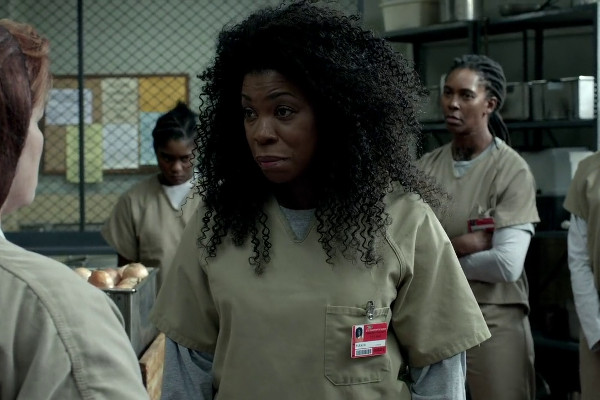
The first five seasons of the programme are available via Amazon.
WARNING: This article is about a series that's aimed at an adult audience. As a result, some of you may find the themes, quotes and images disturbing.
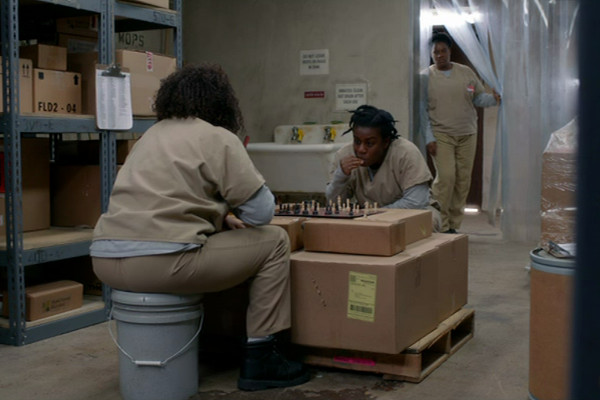
Like season one, there's something of a mid-season slump in season two's narrative, but this is more due to events being set in motion rather than any express padding. As new villain Vee says to Suzanne after a day's cigarette selling, "it's called the long game."
An episode with various different, almost soap operaish strands concludes with senile prisoner "Jimmy" being given compassionate release, and the show's characters opting for a "tell not show" social commentary that's a touch too overt. The flashback story belongs to Black Cindy, a sometimes underused character who wouldn't get an exclusive flashback again until season six.
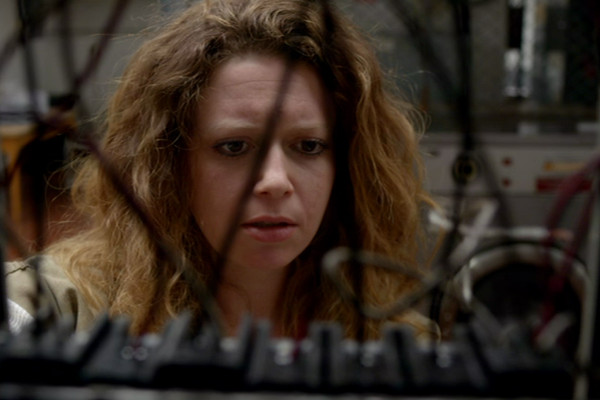
You Also Have A Pizza is very much a transition episode, pushing forward the overall story arc without any great identity of its own. While it tells a somewhat unlikely backstory of fan favourite Poussey (would she really try to kill a man, even for love?) and is the episode where Flaca and Maritza briefly experiment due to loneliness, it feels very much like a water-treading episode rather than a really strong story in and of itself.
It also features Larry making a pass at Polly, two episodes after she exposed her chest to him. This means that both relationships Larry is involved in during the course of the series are as a result of semi-nudity... an unconvincing "short hand" to build sexual tension, rather than the series taking time to write a subtler relationship.
Stephen Falk was the co-executive producer for season two, and You Also Have a Pizza was his sole credit as writer for the series. While some elements are more than welcome - such as a discussion on Alice in Wonderland - other bits, including a metaphor about the sun and moon, sound overly "written" and contrived. It's also the sole OINTB credit for Allison Anders (Gas, Food Lodgings/Four Rooms) as director, and, while fine, there are again some jolts in shot continuity.
Uzo Aduba (Crazy Eyes), Danielle Brooks (Taystee), Vicky Jeudy (Warren), Adrienne C. Moore (Black Cindy) and Samira Wiley (Poussey) recorded a DVD commentary track for the episode, one which contains the info that Wiley had only around a week and a half to learn all the German for this instalment. It's an inessential listen, as most commentary tracks are, but does contain the easy comradery between the actresses, including the revelation that Brooks showed Wiley her chest, to much laughter.
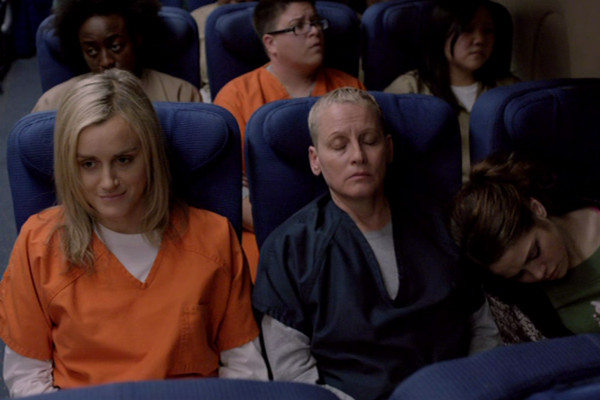
Jodie Foster's second, and, to date, last directing work on Orange is the New Black, it begins with Piper - and, by association, the viewers - disorientated as she's taken out of the regular prison. It's an off-beat start that's very atypical, though Lori Petty's debut as eccentric prisoner Lolly Whitehill is an amusing one, and she would return the following year as a semi-regular.
Those who like trivia might note that Piper gives her DOB as June 7th, 1981, which is three years older than Taylor Schilling's real age. Schilling was also born in Boston, Massachusetts, but here Piper's place of birth is given as Connecticut. Possibly this is to differentiate her from the real-life Piper, Piper Kerman, who, like Schilling, was born in Boston, Massachusetts, and was also around 29 when she served time in prison.
Lastly, once more the bad continuity of the series shows itself, with a scene where Piper is holding a phone with both hands cutting to her holding it with just one when the shot changes angles.
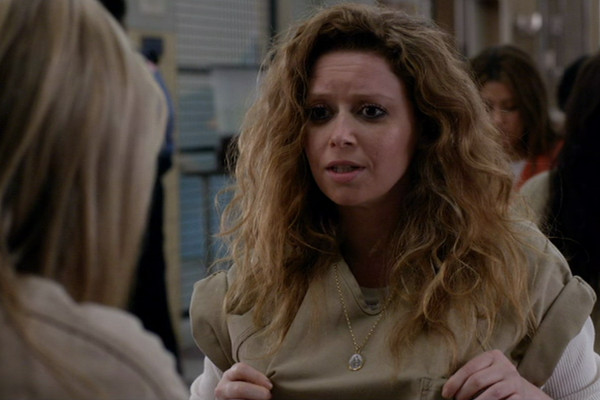
There are times in the series where the actresses show through the cracks of the characters. It arguably happened with the season one finale which, while impressive, did often seem as if it was there to give the cast chance to show their singing voices. Here the most famous scene is probably the moment where Nichols impersonates Alex... an amusing moment, but both actresses present seem genuinely about to laugh and break character. Still, it's a fun moment, and perhaps shouldn't be analysed so closely.
Although season two is an intense and engaging viewing experience, there are many moments, in hindsight, that are more than a little far-fetched. This is flagged up by Vee, who discovers Red's greenhouse secret and notes: "A tunnel, Red? That is so Bugs Bunny." Elsewhere, Pornstache is carted off to jail, and in an intense episode where a mentally ill prisoner is manipulated into assaulting a former friend suffering from depression, Pablo Schreiber's now completely over-the-top performance is almost a welcome relief, and a throwback to a more innocent bygone age of the programme.
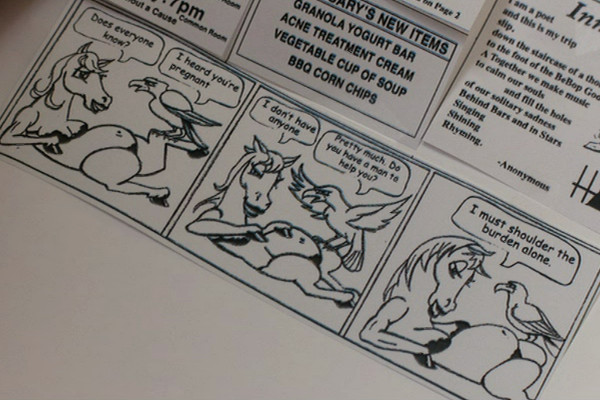
Rightly or wrongly, OITNB has a habit (no pun intended) of showing Christianity to be the sole province of the mentally weak and unhinged. From this point in the series the "flashbacks" began to get more and more sporadic, and almost a third of the episodes from seasons 4-6 discard it altogether. While the use of flashbacks in narrative television now seems a regular part of TV's make-up, it was almost unheard of before the early 2000s. OINTB often does it better than most, though the backstory of Sister Ingalls may be the least essential they ever did.
The rest of the episode veers from (possibly unintentional) foreshadowing, with extra riot gear being brought into the prison, and the disturbing, with Ingalls having a breakdown and one of the elderly prisoners stabbing a black woman in the kidneys, believing her to be Vee. Elsewhere, Alex is under 24 hour protection and Boo is cast out both from Red's "family" and Vee's gang, while Larry begins a committed relationship with Piper's best friend Polly. As with season one, most of these episodes rank low only because the quality is so consistent; even the worst season two episode is arguably better than any from 2018's offering.
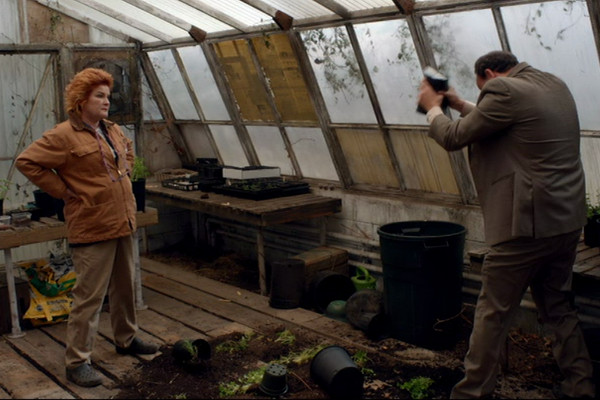
Occasionally a television series can be retroactively undermined by later developments, where a character or plot will contradict what came before. Come seasons five and six and Joe Caputo is a veritable saint, going out of his way to do the right thing with almost no edges.
While this doesn't exactly destroy the credibility of earlier seasons, it is somewhat jarring to rewatch early OITNB and see the compulsive masturbator who goes on a comic rampage throughout this episode, trashing the newly-formed greenhouse and firing a guard because she doesn't return his advances. (This removal of the character also means that her plan to listen to recordings of prisoners speaking Spanish on the telephones and translating it becomes a complete narrative dead end).
The rest of the episode is a bleak one, with a flashback for Rosa in her bank robbing younger days juxtaposed to her being resigned to having terminal cancer. There's a small piece of hope where a young boy she befriended in hospital is in remission, but the episode ends with Piper learning her grandmother is dead, and the Vee-Red confrontation is starting to grip the entire prison. In amongst all this, the return of the hyperreal Pornstache is something of a uplifting moment.